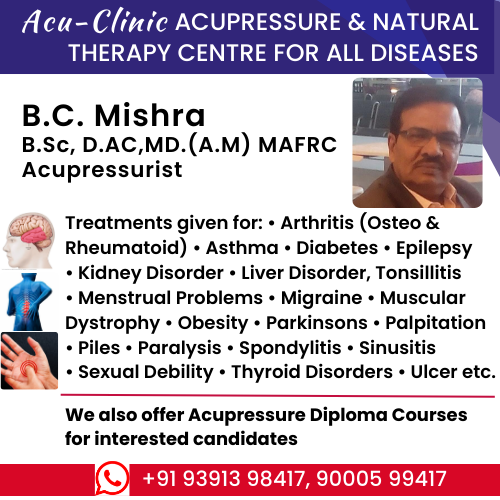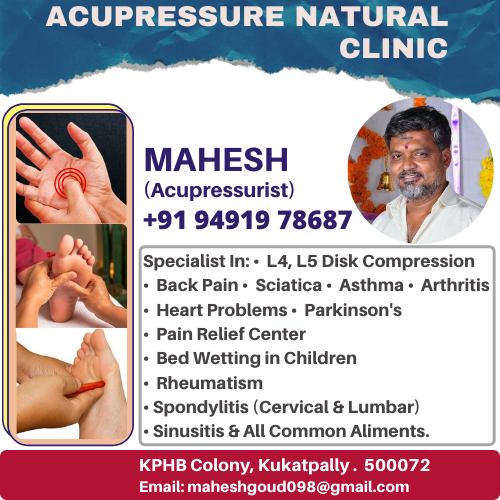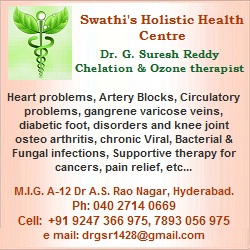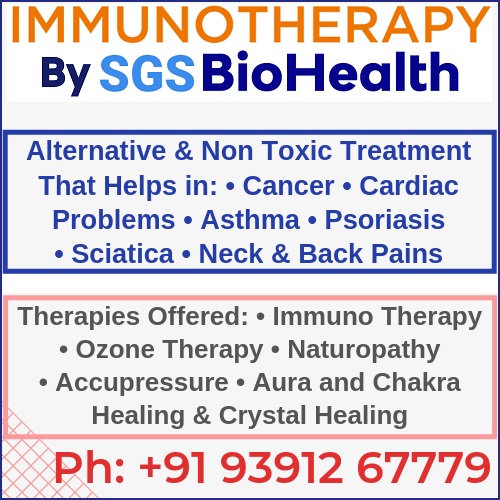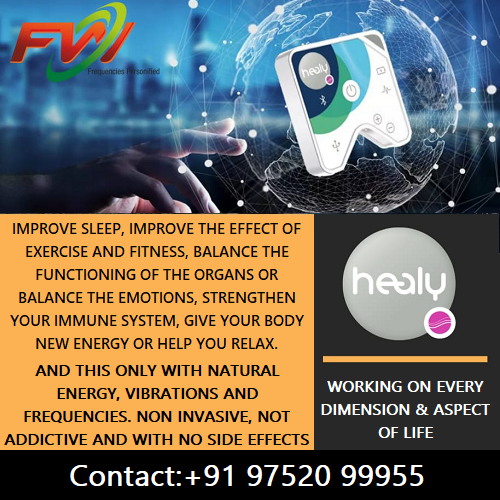wellnessexclusive.com
Your Free Guide to Good Health!

Alternative Therapies
- Alternative Medicine
- Access Bars
- Access Consciousness
- Acupressure
- Acupuncture
- Angel Healing
- Ayurveda
- Bach Flower Remedies
- Breathwork
- Cosmetic Acupuncture
- Crystal Healing
- Cupping Therapy
- Emotional Freedom Technique (EFT)
- Energy Healing
- Energy Medicine
- Ergonomics
- Family Constellation
- Fengshui
- Geopathic Stress
- Holistic Solutions
- Holy Fire Reiki
- Homeopathy
- Hypnotherapy
- Inner Child Therapy
- Jikiden Reiki
- Kwan Yin
- Lama Fera
- Law of Attraction
- Manual Therapy
- Meditation
- Melchizedek Method
- Merlin Trinity Healing
- Motivational Counseling
- Mudra Healing
- Munay - Ki Rites
- Naturopathy
- Neuro Linguistic Programming (NLP)
- Panchakarma (Ayurveda)
- Panchkarma Holistic Healing - Mind Control
- Past Life Regression
- Physiotherapy
- Pranic Healing
- Pythagorean Numerology
- Pyramids
- Reiki
- Rudraksh
- Silva Mind Control Method
- Sujok therapy
- Symphony of Possibilities
- Tarot
- Theta Healing
- Twin Flame Healing
- Unani Medicine
- Violet Flame Healing
- Vision Board
- Yoga
Diseases & Conditions
- Acne & Pimples
- Allergies
- Arthritis
- Asthma
- Behavioural Disorders
- Dandruff
- Diabetes
- Emotional Problems
- Gallstones
- Gastritis
- Hairloss
- Heart Diseases
- Hormonal Problems
- Hypertension
- Immune Disorders
- Infections
- Infertility
- Jaundice
- Kidney Disorders
- Liver Disorders
- Menstrual Disorders
- Migraine
- Neck & Back Pain
- Obesity
- Osteoporosis
- Peptic Ulcer
- Prevention
- Prostate Problems
- Psoriasis
- Sexual Dysfunctions
- Sinusitis
- Sleep Disorders
- Skin Diseases
- Stress
- Thyroid Disorders
- Ulcerative Colitis
- Urinary Infections
General Wellness
Infections Treatment In Nizamabad
Acu-Clinic -- B.C. Mishra B.sc, D.Ac., M.D(A.M),M.A.F.R.C.
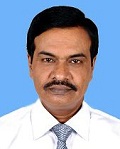
Mr. Mishra is an active & renowned Acupressurist with 16 yrs experience in various types of acute & chronic diseases. He is especially known for his success in dealing with complex and challenging cases.
He is assisted by his wife Nanda Mishra to undertake the treatment of lady patients.

Acupressure Natural Clinic - K Mahesh

Acupressure Natural Clinic founded by Mr. K Mahesh is a premier place for treatment of patients with L4 L5 Disk Compression Treatment (Back pain), Cervical & Lumbar Spondylosis, Sciatica, Asthma, Arthritis, Parkinson's, Rheumatism, Bedwetting in children, Sinusitis.

Holistic health Care - Prakruti Swasthya Kendra

A Unit of Holistic Medicine Research Foundation - Asia's first and foremost ISO 9001:2008 certified pioneer research centre on Holistic Medicines - Prof. Dr. Deepak Rout (Gold Medalist)...

SGS Bio Health
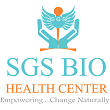
Immunotherapy is an advancement natural in the field of Immune treatment which boost the body's immune system and penetrate ozone o3 molecule through body pores to fight against the Immune Diseases causing cells, at SGS Bio Health Center...

Ms. Archana Kabilan

Archana Kabilan, a Bach Foundation Registered Practitioner (BFRP) (UK), offers a blend of Bach Flower services in support of stress management by reducing stress and promoting relaxation to enhance wellness.


Dr. Rahul. B.L.
Dr. Rahul is personable & outgoing, comfortable communicating with people from diverse backgrounds, occupations & cultures, with key focus on the reading of energy's chakras & auras with great ability. He helps in removing energy blocks & heals the individual to live a healthy physical, mental, emotional, spiritual & positive life.

Healy Frequency Healing Device

Wellness and well-being principles revolve around maintaining the balance between the mind, body and soul. Healy is the only device on the planet earth for balancing between Body, Mind and Soul.


INFECTIONS
Many human infections are caused by either bacteria or viruses. Bacteria are tiny single-celled organisms, thought by some researchers to be related to plants. They are among the most successful life forms on the planet, and range in habitat from ice slopes to deserts.
Bacteria can be beneficial - for instance, gut bacteria help us to digest food - but some are responsible for a range of infections. These disease-causing varieties are called pathogenic bacteria. Many bacterial infections can be treated successfully with appropriate antibiotics, although antibiotic-resistant strains are beginning to emerge. Immunisation is available to prevent many important bacterial diseases.
A virus is an even smaller micro-organism that can only reproduce inside a host's living cell. It is very difficult to kill a virus. That's why some of the most serious communicable diseases known to medical science are viral in origin.
How bacteria and viruses enter the body
To cause disease, pathogenic bacteria must gain access into the body. The range of access routes for bacteria includes:
Cuts
Contaminated food or water
Close contact with an infected person
Contact with the faeces of an infected person
Breathing in the exhaled droplets when an infected person coughs or sneezes
Indirectly, by touching contaminated surfaces - such as taps, toilet handles, toys and nappies.
Viruses are spread from one person to another by:
Coughs
Sneezes
Vomits
Bites from infected animals or insects
Exposure to infected bodily fluids through activities such as sexual intercourse or sharing hypodermic needles.
Forgetting to wash your hands after handling pets and animals is another way for germs to be taken in by mouth.
Curing a bacterial infection
The body reacts to disease-causing bacteria by increasing local blood flow (inflammation) and sending in cells from the immune system to attack and destroy the bacteria. Antibodies produced by the immune system attach to the bacteria and help in their destruction. They may also inactivate toxins produced by particular pathogens, for example tetanus and diphtheria.
Serious infections can be treated with antibiotics, which work by disrupting the bacterium's metabolic processes, although antibiotic-resistant strains are starting to emerge. Immunisation is available to prevent many important bacterial diseases such as Hemophilus influenza Type b (Hib), tetanus and whooping cough..
Curing a viral infection
Antibiotics are useless against viral infections. This is because viruses are so simple that they use their host cells to perform their activities for them. So antiviral drugs work differently to antibiotics, by interfering with the viral enzymes instead.
Antiviral drugs are currently only effective against a few viral diseases, such as influenza, herpes, hepatitis B and C and HIV - but research is ongoing. A naturally occurring protein, called interferon (which the body produces to help fight viral infections), can now be produced in the laboratory and is used to treat hepatitis C infections.
Immunisation against viral infection is not always possible
It is possible to vaccinate against many serious viral infections such as measles, mumps, hepatitis A and hepatitis B. An aggressive worldwide vaccination campaign, headed by the World Health Organization (WHO), managed to wipe out smallpox. However, some viruses - such as those that cause the common cold - are capable of mutating from one person to the next. This is how an infection with essentially the same virus can keep dodging the immune system. Vaccination for these kinds of viruses is difficult, because the viruses have already changed their format by the time vaccines are developed.
Where to get help
Your doctor
Your pharmacist
Things to remember
Many human illnesses are caused by infection with either bacteria or viruses.
Most bacterial diseases can be treated with antibiotics, although antibiotic-resistant strains are starting to emerge.
Viruses pose a challenge to the body's immune system because they hide inside cells.
It is possible to be vaccinated against some of the major disease-causing viruses (such as measles and polio), as well as bacterial diseases such as Hemophilus influenza Type b (Hib), tetanus and whooping cough.
